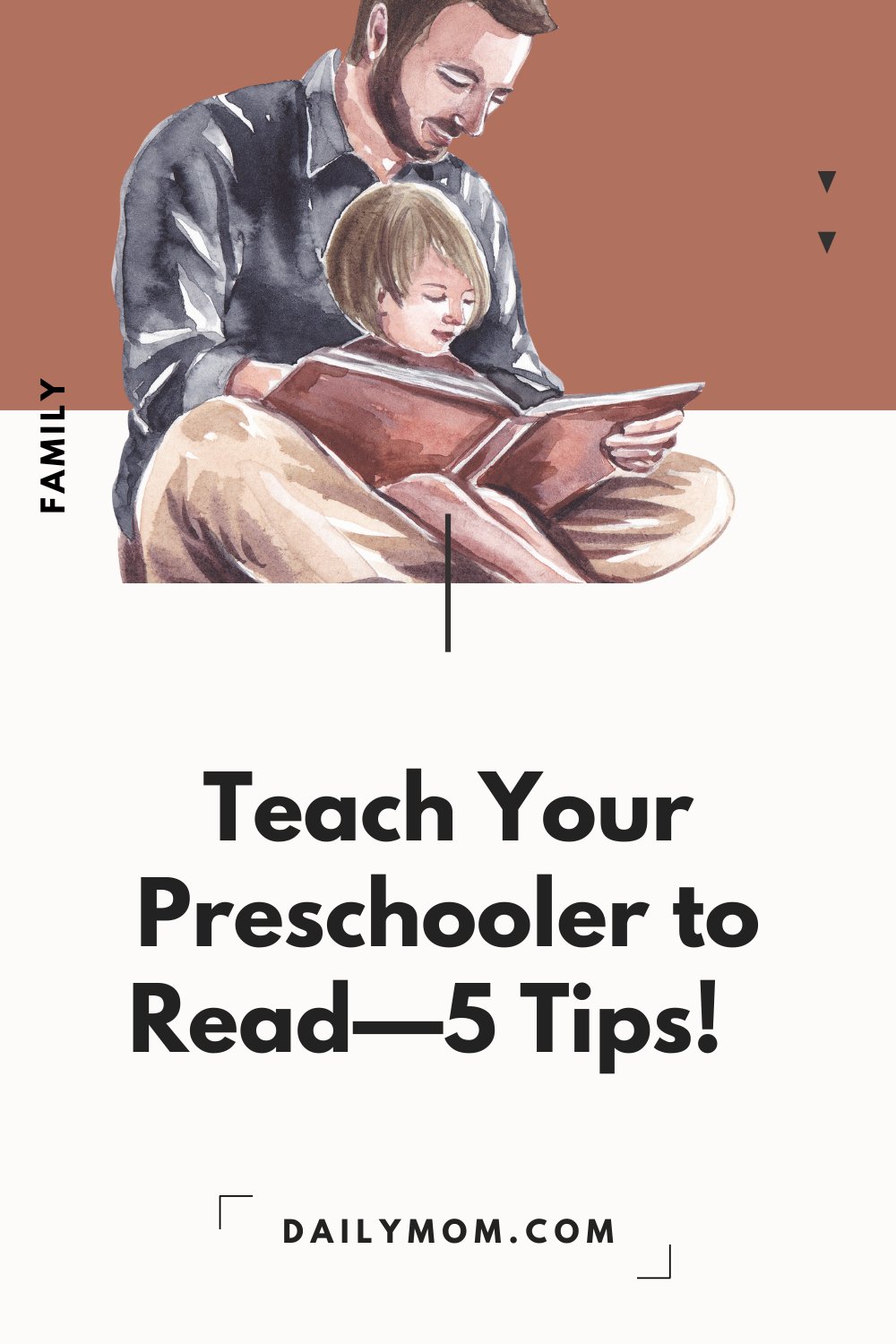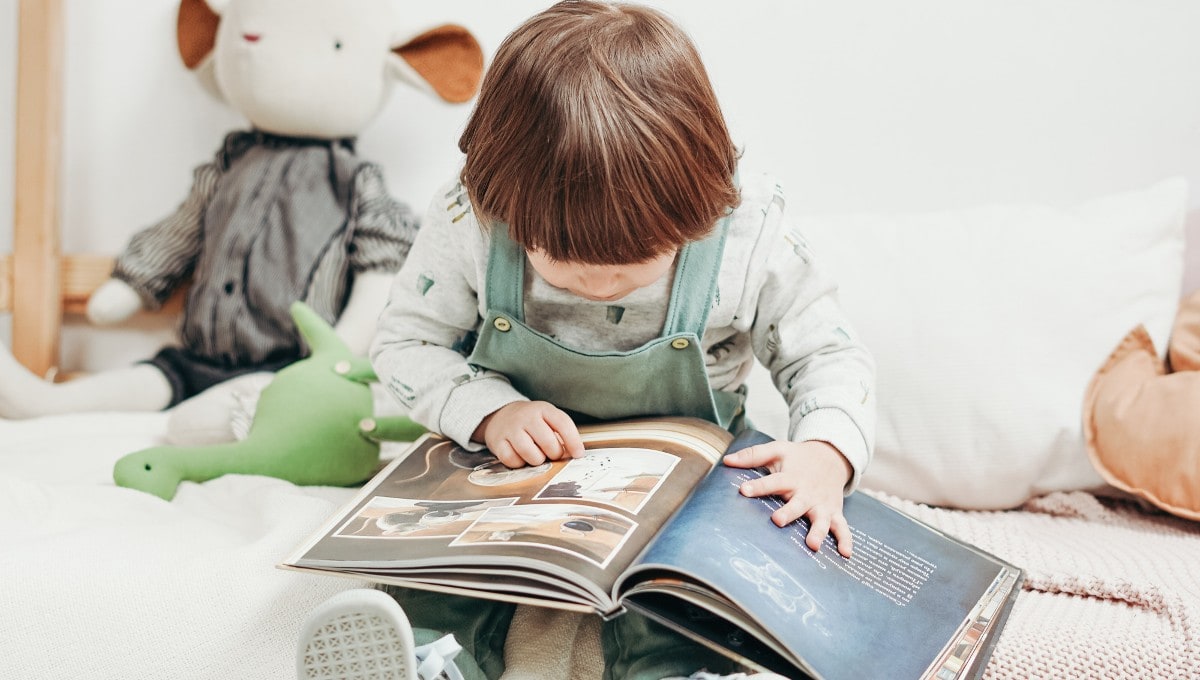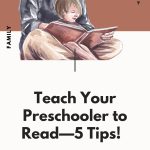Moms, dads, grandmas, grandpas, friends, neighbors—even strangers—everybody’s got an opinion on whether or not you should teach your preschooler to read. People will (oh-so-kindly) suggest you’re pushing your child, or that your preschool reader should be exploring the world through dance, song, play—not the written word.
Others will say this about a preschool reader: “Better late than never.”
And then there are the scare tactics: “Don’t you want your child to start school at the head of the class?” “What if your child gets lost in the system and never learns to read?” and “Do you want your kiddo to struggle?” (Try to ignore the scare tactics, please.)
So what do you think? How do you feel about a preschool reader? A child learning to read at age three or four? After all, yours is the opinion that counts.
READ MORE: Homeschool Preschool: The Surprising Reasons Why It Might Be The Best for Your Family

Signs of Reading Readiness to Become a Preschool Reader
If you’ve been reading to your child since before birth, you may have recently noticed your child has become curious about the symbols that go with the pictures. Maybe your child ‘pretends’ to read, or they’re more interested in doing what you’re doing—actually reading the book. Perhaps your child has a natural talent for language and has begun reciting books to you by heart, doing a great imitation of a preschool reader who can actually read.
If so, pay attention to these signs of reading readiness in your preschool reader:
- Your child begins to associate the printed words with the story. Simply put, your preschool reader has become aware you’re actually getting information from the symbols on the page.
- You notice your child has a degree of phonological awareness: making up rhymes, isolating sounds, and the ability to ‘tap out’ syllables.
- He’s interested! When your child asks you to teach him to read, you probably have a preschool reader on your hands.
If you’ve decided to teach your preschooler to read, more power to you! That said, working with such a young child requires special considerations that may not apply to older children.
For starters, try to resist teaching your child to read until they’re three years old. Before the age of three, your child is busy absorbing the world in a less structured way, which is important for developing early learning skills. Plus, a child’s vision may not be mature enough to decipher a series of letters, so the entire exercise could be one of frustration.
So if your child is three years old and showing signs of readiness, go for it! But please keep the following 5 tips in mind when working with a preschool reader.
READ MORE: Give the Gift of Reading: Books for Preschoolers and Young Kids

5 Tips for Developing a Preschool Reader
TIMING FOR TEACHING A PRESCHOOL READER
The best age to start teaching your preschooler to read is when you and your child are ready to begin. If you’re having fun teaching and your child is having fun learning, you’ve chosen the perfect time. If you sense your child needs a break, skip a few days, then reintroduce your lessons for a fresh start. If it means putting your materials away for a longer period of time, that’s okay, too. There are no deadlines.
PACING LESSONS FOR A PRESCHOOL READER
While some three-year-olds zip right through the process, some don’t. Let your child set the pace. There’s no rule that says your child must be reading before kindergarten, so spend as much time as you need on each lesson. As long as your child is in charge of how quickly you progress, you should have a fairly easy time of it.
ENVIRONMENT FOR LEARNING FOR A PRESCHOOL READER
Make it cozy! Snuggle into a comfy chair or cuddle up in your child’s bed at night. Invite Pooh Bear and Piglet to join the party. The more you surround your lessons with happy vibes, the more your child will associate reading with fun.

READ MORE: 20 Books to Inspire Preschool Girls
UN-LESSONS FOR YOUR PRESCHOOL READER
Refrain from ‘testing’ your preschool reader in any way. In fact, you may want to call your time together “playing with letters” instead of “learning to read.” Lessons may need to be repeated more often than with an older child, so don’t focus on progress—just the process.
BOASTING ABOUT YOUR PRESCHOOL READER
Please, please, please don’t ask your little one to show off her newly-learned skills! Reading has its own rewards, and we don’t want your child to confuse her reading skills with external praise. What WILL happen is that once your child learns to read, people will notice. Try to let that be a natural outcome rather than a forced one.
The bottom line is, if you’re teaching your preschooler to read, you have plenty of time. No pressure, no hurry. Enjoy it! If you’re willing to let your child set the pace, learning to read comes easily and naturally for most kids.
WANT TO READ MORE?
Go Outside and Get Creative: Fun Outdoor Activities for Kids to Enjoy in the Sun
Photo credits: Unsplash, Pexels, istockphoto
CONNECT WITH DAILY MOM
💖 NEWSLETTER: DAILY READS IN YOUR INBOX 💖
Sign up to receive our picks for the best things to do, see and buy so you can relax and focus on more important tasks! Let us help you be the best version of yourself you can be!
BE SOCIAL WITH US
📌 LOVE IT? PIN IT!📌










































